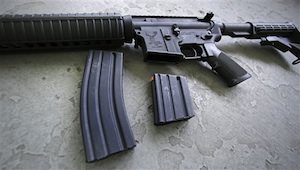Mass Violence, Gun Control and the American Culture of Death
In the wake of Monday's deadly Boston Marathon bombings, should we urge the Senate to proceed with the gun control debate as scheduled? Or should we condemn both chambers of Congress and the president for doing too little, too late to deal with the problem of mass violence and what some have termed the nation’s culture of death?The Boston Marathon blasts took the lives of three people. They also threaten to take another casualty, postponing, if not entirely derailing, the Senate debate on gun control.
Monday’s bombings at the Boston Marathon took the lives of three people and injured at least 175, some critically. The blasts also threaten to take another casualty, postponing, if not entirely derailing, the Senate debate on gun control as right-wing opponents of firearm safety legislation rush to argue the folly of trying to stop violence with any type of legislative reform.
The questions for progressives thus arise: Should we urge the Senate to proceed with the debate? Or should we condemn both chambers of Congress and the president for doing too little, too late to deal with the problem of mass violence, whatever its origin, and what some have termed the nation’s culture of death?
The answer is both, with an urgent emphasis on the latter.
Let’s start by looking at the bright side. On April 11, by a margin of 68-31, the Senate voted to begin consideration of gun legislation, turning back a Republican filibuster threat and paving the way for the most significant congressional debate on gun policy since the expiration of the assault weapons ban in 2004.
At the center of the debate, which is expected to last weeks, is a bipartisan compromise sponsored by Democrat Joe Manchin III of West Virginia and Republican Patrick Toomey of Pennsylvania — The Public Safety and Second Amendment Rights Protection Act. If passed, the measure would expand the National Instant Criminal Background Check System to include sales at gun shows and over the Internet, encourage states to upload all their available records into the NICS and establish a federal commission to examine the causes of mass violence.
Before the Boston bombings, the mere prospect of such provisions becoming law had been widely hailed as a watershed moment, leaving some moderate and liberal commentators giddy with anticipation and some on the right such as Sean Hannity and Ann Coulter condemning the compromise for its “naked exploitation of dead children and grieving families” and forecasting the imminent demise of the Second Amendment.
It’s anticipated that when the Senate finally begins debate, gun control advocates will also press to reinstate the ban on military style weapons, prohibit the sale of high capacity magazines and increase funding for community based mental health centers. Gun control opponents are expected to block any new bans while offering their own countermeasures, including proposals to lift existing restrictions on gun ownership by mentally ill veterans and even one that would declare all limits on gun ownership unconstitutional.
It’s by no means certain that when the dust finally settles, any meaningful new laws will get through the Senate, much less the House, or what effect in the end the Boston attacks will have on individual legislators. But even if all that emerges is something close to the present version of the Manchin-Toomey bill aimed at bolstering the NICS and expanding the scope of background checks, we will have moved in the right direction, as nearly 40 percent of all gun sales are unregulated transactions made by private, unlicensed vendors, many at gun shows and conventions. Making it harder for those with criminal records and certain grave and documented mental conditions to obtain guns will help save innocent lives.
At the same time, that help will fall abysmally short of addressing the biggest problem of all — our perverse culture of death. Although the term “culture of death” largely has been used by the right wing to promote its anti-abortion agenda, it more aptly applies to what Rich Broderick, an unheralded journalist who writes for the online Twin Cities Daily Planet, describes as a “culture that embraces a soulless free-market idolatry in which the value of everything, including human beings, is determined by the bottom line. … It is a culture of death that prevails on Wall Street, K-Street, Hollywood, and our ever expanding Military-Industrial-Congressional Complex.”
Just how deep-seated that culture has become was confirmed beyond conjecture in a comprehensive report released in January by the National Research Council and the Institute of Medicine.
Comparing data on diseases, injuries and behaviors for the United States and 16 other high-income democracies, such as Australia, Canada, Japan and several Western European nations, the study concluded that Americans have shorter life expectancies, face greater odds of surviving past 50 and suffer more violent deaths than the populations of peer countries.
Among its specific findings, the study disclosed that the U.S. records six violent deaths per 100,000 people each year. Its closest rival, Finland, has two. At the same time, the U.S. has the highest rate of gun ownership at 89 guns per 100 residents, accounting for 35 to 50 percent of civilian-owned firearms worldwide.
In addition to highlighting the jarring rates of lethal violence in America, the report also ranked the U.S. at or near the bottom among the countries surveyed in nine key additional areas impacting life expectancy, including drug- and alcohol-related deaths, infant mortality, obesity and diabetes, heart and chronic lung disease, and disability. The U.S. also had higher rates of poverty and economic inequality than its peers, and lagged behind other nations in education.
The portrait of the world’s wealthiest and most powerful country that emerges from the report is a society at war with itself, in need of a top-to-bottom makeover that links gun control to wider demands for social and economic justice. No matter who is responsible for the Boston bombings, nothing less is needed if we are to have any real hope of replacing our culture of death with a culture of life.
Your support matters…Independent journalism is under threat and overshadowed by heavily funded mainstream media.
You can help level the playing field. Become a member.
Your tax-deductible contribution keeps us digging beneath the headlines to give you thought-provoking, investigative reporting and analysis that unearths what's really happening- without compromise.
Give today to support our courageous, independent journalists.


You need to be a supporter to comment.
There are currently no responses to this article.
Be the first to respond.